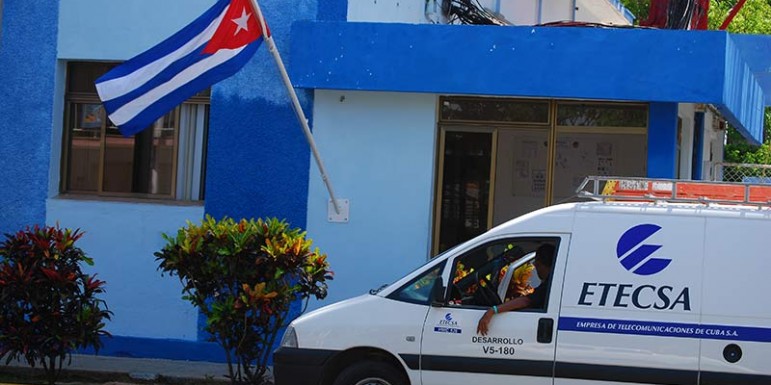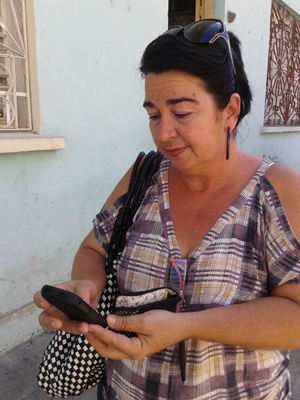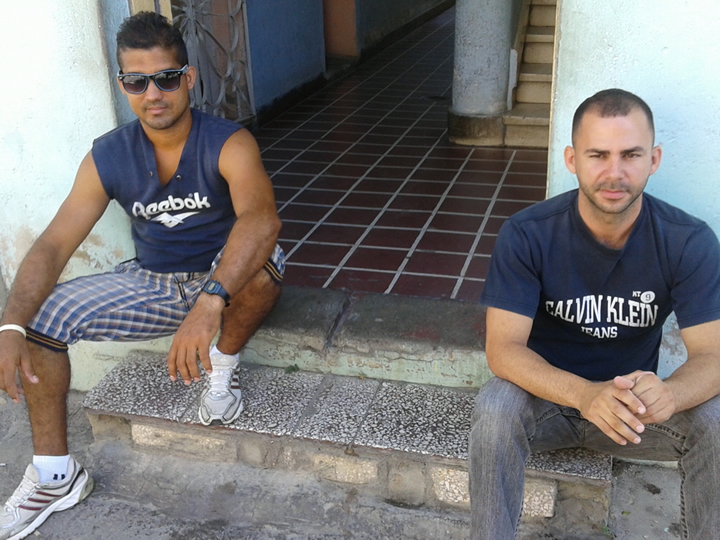
Phone company cries foul over ‘bypasses’
Relations between public opinion and the Telecommunications Company of Cuba (ETECSA) remain tense after the company and the authorities appeared to engage in an image-cleansing or attention-diversion campaign.
The confrontation began several weeks ago, in the form of “fraud” and illegalities committed by citizens to evade control of the phone service by the nation’s only telecommunications provider, or to obtain revenues without mediation by state agencies. (For details on the techniques used, in Spanish, click here.)
In the past few days, new denunciations about million-peso losses through the use of “bypasses” for international calls and texting, and even a TV series on police response to “computer crime,” have fueled the debate, which ranges from what’s legal to what’s legitimate.
“I don’t agree with the fraud, but the truth is that ETECSA charges prices for mobile service that an ordinary worker can barely afford on his income,” comments Amarilys, a vendor of crafts in the southern city of Cienfuegos.
“Education is free, but the country pays to educate computer engineers, so it doesn’t seem right to me that they should start working for foreign clients without some control,” argues Liset, another crafts vendor, who watched the episode on “computer crime” on the TV series “On the Trail.”
“Still, I understand the fact that they look for alternative income, in view of the low salaries the State pays them,” she says.
The statements from ETECSA’s spokesmen and the reports in the media stress the due discipline that citizens must maintain, but they barely acknowledge ETECSA’s own flaws and the true motivation of the evasive maneuvers: the right to communicate without excessive barriers and to earn a fair income for work performed.
 “Thursday night, I received 70 repetitions of a message sent to my Nauta account. Obviously, it was an error by the ETECSA server, but it was charged to my account. When I complained, the clerk said that it was a configuration problem and nothing could be done about it. Well, I’m the one who’s affected and they won’t refund me!” complains Marlene López, a housewife who uses texting to communicate with her daughter, on a “medical mission” in Venezuela.
“Thursday night, I received 70 repetitions of a message sent to my Nauta account. Obviously, it was an error by the ETECSA server, but it was charged to my account. When I complained, the clerk said that it was a configuration problem and nothing could be done about it. Well, I’m the one who’s affected and they won’t refund me!” complains Marlene López, a housewife who uses texting to communicate with her daughter, on a “medical mission” in Venezuela.
Long lines, high prices and little satisfaction for the client add up to the reasons why citizens look for an illegal alternative to ETECSA.
In several private homes in Cienfuegos, despite official warnings, residents offer calls to other countries for fees ranging from 35 cents to 55 cents of a convertible peso (CUC) per minute, whereas ETECSA’s rates range from 1 CUC to 1.80 CUC per minute. The CUC is officially on a par with the dollar.
Even on the days when cell phones can be recharged from abroad, those private entrepreneurs offer a double-recharge bonus if the phone user pays in Cuba. Users have repeatedly asked ETECSA for the same promotion but the company has only provided it once, last April.
“After the TV series ran that police episode last Sunday, people became jittery,” say Rafael and Jorge, two computer experts who legally repair cell phones and have opposite views on the issue dramatized on the TV program, which is “based on actual events.”
“To produce software for clients abroad without control by the State is to perform unfair competition against the existing [communication] companies and avoid paying taxes,” Jorge argues.
“That might be,” counters Rafael, “but I would rather earn 300 or 1,000 dollars for programming a system for a foreign client than to receive no more than 25 dollars for working for the State.”
The reality is a lot more complex than what the biased official accounts portray. Reasons imposed by the State and unsatisfactory responses to users’ needs do not lead to consensus. These pending issues need to be solved before relations between the users and the State can loosen up.



